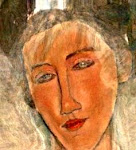At seventeen,
I was an art student looking for an either full- or part-time advertising job
in the city where I lived, which was known as a capital of design. I had learned
the theoretical skills of graphic art and was eager to acquire the practice as
well. I tirelessly copied down from the Yellow Pages dozens addresses of
agencies and started to explore, starry eyed, my portfolio under my arm, to
enquire whether they needed apprentices.
I walked
from agency to agency, sitting interviews and being politely rejected by each
one. Conscious of my lack of experience, being young, shy and unaware of the
world I was exploring, my demands were modest. When confronted by the question
“ How much?” I started stuttering “Whatever you decide I am worth”.
I walked
into an agency and was surprised to find two girls, former school companions of
mine, who were trainees in it. They welcomed me merrily and introduced me to the art director who had
hired them. When we were at school, I was considered top of the class, whereas
they were somewhat notorious for being
lazy and somewhat easy. Here, instead, they seemed to enjoy what they
were doing and appeared to do it with a degree of competence. They convinced
their boss to let me have a go. I was overjoyed and started my apprenticeship.
There were several nice activities that I could finally put to practice –
layouts, storyboards, choice of colours and fonts plus a myriad other little
playful games. And all this, unlike at school, was done for REAL paying clients.
When I went back home that evening I was thrilled and looking forward to the
next morning.At the end of day two, the art director walked over to me and whispered mournfully that he regretted it, but they could not keep me, because they had already enough interns. Bang. I was shot through the heart. Good luck and so long.
My search
resumed. On one occasion I was kept waiting several hours for an interview with
the boss who in the end never made an appearance. Most of the times I was
simply dismissed without even the prospective employers taking a look at my
portfolio.
I was given
a chance at an umpteenth agency. They told me that they would consider what
wages they’d give me after a training period of a month. So I went everyday and
did all I was asked to do – not very exciting, rather menial jobs on the whole,
but sort of training grounds. When pay day came, I went to the boss and asked
with a smile what he thought I deserved. He answered thus: “You are an apprentice:
we are teaching you a job, therefore YOU should pay US. But if you want to
continue, we will be generous and give you a chance for free”. I was too
naïve to report the agency to the labour unions – what did I know of this murky
jungle after all?
Deeply
dispirited as I was, I had another go in a final agency. However, the work I
did there was truly uninteresting and the wages were peanuts.
After a few
months of fruitless search I had almost given up, when I received a call from a
gentlemen with a foreign accent who said he had
got my name from mutual acquaintances. He wanted to see me. I went to
the appointment with my portfolio and a little hope. He had a private studio in
one of the city skyscrapers and was an amateur painter and a Swiss businessman.
He was in his eighties.
He had a
look at my portfolio and gave me a positive assessment; he said he was planning
to illustrate a new edition of Desiderius Erasmus’s The Praise of Folly and invited me to do some sketches of those
passages that I found most impressive.
He lent me the book and asked me to read it. This would be the first of my
tasks.
The second
task would be to pose for him, for which I would get attractive fees. I was
dumbfounded. I was a graphic designer, not an artist’s model; on the other
hand, I was penniless and keen on becoming independent of my family. He sensed
my bafflement and reassured me: “I am an old man, I could not molest you even
if I tried. All I am asking you is to be my model, dressed and undressed. Don’t
give me an answer now. Think about it, and next week you’ll let me know.
Meanwhile start reading The Praise of
Folly and see it if it inspires you some artistic output.”
He bid me
goodbye with a smile and a stroke on my head. As I rode the lift leaving his
studio, I was utterly confused. He looked a real gentleman, old, well dressed,
mild-mannered; he appeared to have money but wasn’t a braggart. He gave me the
impression of being very lonely, but this could also spell danger…
I was
undecided whether to go back to his atelier or let the thing fall through. I
had his book, true, but I could return it to him by post. Instead, he rang and
asked me if I had started reading it and had got some ideas. He was ever so
polite; how could I have doubted his intentions? His call spurred me on to
develop a few ideas for illustrations. I wanted to show him that this was my
priority: I was serious about becoming a professional illustrator, so I drew a
number of sketches, which I took to him at our following meeting.
He
considered them carefully, gave a positive technical evaluation and started
discussing the book with me. He wanted to know my impressions; I was rightly
embarrassed, because I felt my cultural level to be well below his own. He
graciously said that Erasmus’s prose would grow on me, and that my drawings
confirmed that. Then he asked if I had considered his proposal of modelling for
him.
I blushed
and said that I accepted it. He was glad, and asked me to remove my blouse and
bra. He turned away to spare my embarrassment. When I told him I was ready, he
turned to look at me betraying no
emotion. He considered me from all angles, then started sketching on his pad.
We had a
number of these sessions. He was always gentlemanly, never attempted to touch
or kiss; I was growing more confident and slowly stopped doing drawings for the
book. I simply posed for him and he paid me regularly. Sometimes he even took
me out for a drink; once we drove over the border to Switzerland in his car and
had an aperitif in an elegant bar on the lake shore. He looked very old and
sad. I couldn’t – and wouldn’t – get through to him. For me he was my employer;
he belonged to another social class, another generation, another world. I never
asked about him or his family, nor he about me or my family. There was a
barrier between us. Probably this is what made him sad.
Autumn came
and I started having a young boyfriend. My relationship with the Swiss slowed
down. Our sessions thinned out, then stopped altogether. I never heard anything
about the old man again. All that I am left with of our interlude is a present
he gave me – a nude portrait he did of me, crayon on paper.
21.10.2014
© DaniBlue












4 comments:
ciao Daniela, ho letto che ti sei lanciata nell'autobiografia e oltretutto in inglese...accipicchia del Perù! Da designer grafica a modella, il percorso non è evidente ma forse è questo il bello della gioventù, tutte le strade aperte....
bacioni sara
Chi si vede! Grazie del commento Sara. Mi fa davvero piacere.
Avevo già scritto note autobiografiche in passato, sempre in inglese, per una sorta di strano pudore, forse...
Il percorso è abbastanza evidente, a me pare. Ti ricordi le illustrazioni che ho fatto per La Perpetua? Poi la vena si è prosciugata e ormai sono anni che non disegno più.
Comunque, la mia opinione è che la gioventù è tutt'altro che bella: è l'età dell'insicurezza, della confusione. Per me, almeno, è stata infernale.
Un abbraccio affettuoso,
Daniela
sono d'accordo che la gioventù sia un'età difficile, tormentata, piena di confusioni e punti interrogativi senza risposta, (io pensavo al suicidio un giorno si e un giorno no) difatti non ho scritto che è "bella", però che tutte le porte sono ancora aperte anche se allora non ce se ne rendeva conto
Già. Mi sai dire se conosci qualcuno che in adolescenza non abbia mai contemplato il suicidio? Per parafrasare Woody Allen, eravamo tutti troppo disperati per suicidarci.
Post a Comment